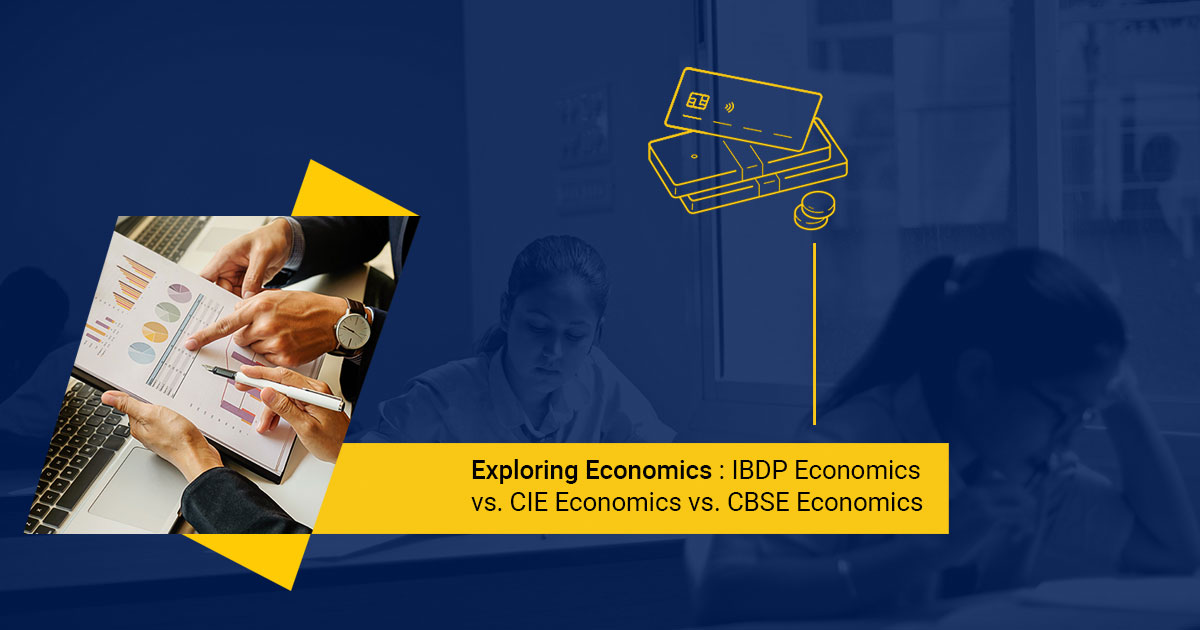

A survey by an educational portal claims that a career in economics is expected to grow by 8% in the coming years. An education in economics students develop a versatile skill set that is highly coveted across various industries. Studying economics helps students develop skills in data analysis, critical thinking, and problem-solving, thereby making them highly sought-after in both public and private sectors. With rapid globalisation, numerous countries rely on one another for trade and diplomacy, and other practices. This global dependency on different nationalities has made a career in economics an ideal choice. To help the students become aware of the complexities of economic principles and theories, the International Baccalaureate Diploma Programme (IBDP), Cambridge International Examinations (CIE), and the Central Board of Secondary Education (CBSE) have put forth their well-crafted economics curriculum. Let us understand and explore each of these curricula in detail:
IBDP Economics
Economics is a captivating discipline that enables students to grasp the intricacies of economic activities in our rapidly changing world. The IBDP economics offered at both Standard Level (SL) and Higher Level (HL) employs economic theories to analyse the decision-making process:
These decisions taken by consumers, producers, and governments can result in both favourable and unfavourable outcomes, impacting the welfare of individuals and communities. Economics, as a social science, dissects these choices through models and theories. The IBDP economics course encourages students to explore and apply these models and theories while investigating the six real-world issues.
By focusing on six real-world issues through the nine key concepts (scarcity, choice, efficiency, equity, economic well-being, sustainability, change, interdependence, and intervention), students in the IBDP economics programme develop the knowledge, skills, values, and attitudes needed to act responsibly as global citizens.
IBDP Economics Assessment:
The internal assessment requires both SL and HL students to create a portfolio of three commentaries based on published news media excerpts and key concepts. Additionally, for external assessment, SL students appear for two examinations, while HL students undertake three examinations.
CIE Economics
CIE Economics is a globally recognised educational programme rendering a holistic understanding of economic theories, principles, and their practical applications. The IGCSE curriculum offers a range of economic subjects, including, microeconomics, macroeconomics, and international economics, thereby preparing students to:
In the CIE economics, there is a strong focus on fostering critical thinking, problem-solving, and analytical abilities. These proficiencies empower students to assess economic data, decipher economic patterns, and assess the consequences of economic policies. CIE Economics also fosters a global perspective, making students aware of international economic interdependencies. Students also learn about the consequences of economic decisions on a broader scale.
CIE Economics equips students to pursue higher education in economics, business, finance, and related fields. The curriculum underscores the practical applicability of economic concepts and the development of research and communication skills.
CIE Economics Assessment:
The programme utilises a diverse range of assessment techniques, including written exams, multiple-choice queries, data-based questions, and case studies. These approaches offer a comprehensive evaluation of students' competencies and skill-level.
CBSE Economics
CBSE Economics is designed for students in classes 11 and 12 and covers both microeconomics and macroeconomics. The curriculum is tailored to provide students with a fundamental understanding of the following topics:
The curriculum emphasises practical learning and encourages students to analyse and interpret economic data, as well as understand economic policies and their implications. Students must employ economic theories to analyse current economic problems, thereby bridging the gap between theoretical concepts and real-world situations. The curriculum focuses on enhancing skills, including data analysis, critical thinking, and effective communication skills.
CBSE Economics promotes economic awareness among students, allowing them to stay informed about economic policies and issues. The curriculum also explores government policies and programmes related to economic growth, development, and social welfare. Furthermore, CBSE curriculum in Economics often encourages interdisciplinary learning by linking economic concepts with subjects like mathematics, statistics, and social sciences.
CBSE Economics Assessment:
CBSE Economics is a crucial subject for students preparing for their Class 12 board examinations. Assessment includes periodic tests, classwork, project work, assignments, and a final examination. Students are often required to conduct surveys, research, and present their findings as part of their project work.
Way Forward
Economics education equips students with a unique skill set that is highly sought-after across various industries. With our increasingly interconnected world, economics students play a crucial role in understanding complex economic principles, making informed decisions, and fostering responsible global citizenship. The IBDP, CIE, and CBSE boards have meticulously designed economics curricula that promote real-world engagement and skill development. These curricula prepare students for academic and professional success through internal assessments, external examinations, and interdisciplinary learning.
Recent Blogs
IGCSE Full Form
What is the International Baccalaureate?
IBDP Full Form
CIE Board Full Form
CBSE Full Form
Site Designed and Maintained By : Office of Communications, JAIN Group All rights reserved.